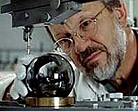|
The ancient philosopher Plato theorized that intellectual "forms" (or patterns) were the architectural design and substrata of the physical world. These forms are not abstractions from experience, but were discovered in experience — that is, they really exist as "ontological entities" (hence Plato is sometimes called a "metaphysical realist," meaning that these forms have some sort of objective, real existence in the universe). Scientific realism likewise has the same sort of commitment at work. After all, when scientists and engineers attempt to create a "perfect sphere" they have something in mind — something non-physical and ideal — that they use as a standard. A given (empirical) sphere is then judged as to how closely it resembles this idealization (e.g., this one is +/- 35 nanometres out of [perfect] roundness). The entire realm of mathematics likewise believes in the reality of discovery in the realm of the ideal. Mathematical discoveries provide a "map" for the empirical, non-ideal, and "imperfect/messy" world in which we live. This finds traction, of course, in technology, so (for instance) scientists can make precise calculations that will enable rocket ships to reach the moon or submarines to plumb the depths of subterranean waters. The same is true of logic. No one "invented" the rules of logic (such as the law of identity, the law of contradiction, valid rules of inference, etc.) but they are presupposed in all forms of intelligible thinking about anything at all... You cannot not use logic to argue against its validity.
In the realm of ethics, we encounter the ideal once again. The voice of conscience and the inherent duty to "do good and not evil" is universally acknowledged, despite the empirical reality of various forms of selfishness expressed by individual men. We all encounter the "is/ought" disparity in the world around us, and we intuitively appeal to standards of justice and fairness whenever we perceive deviations from the ideal in human behavior. Hence Immanuel Kant posited the categorical imperative ("act only according to that maxim whereby you can at the same time will that it should become a universal law") as a sort of rational formulation of the voice of conscience, ruling out the idea that people can be "used" as a means to other ends.... But Kant no more "invented" this moral law than Copernicus "invented" the spherical shape of the planet earth.
The doctrines of metaphysical realism and the idea that people are duty bound to obey their consciences have never been popular among the so-called intelligentsia of the world, and therefore most of the world's philosophers have engaged in various exercises of obscurantism and hair-splitting to escape the implications. (In fact, it could be argued that much of secular philosophy is nothing but such an exercise.) What implications might these be? How about that there is a real, objective world — known both in the physical and in the moral realms — and people are under its authority and demands. Reality, both physical and moral, is governed by law, and the origin of this law is a Lawgiver. This Lawgiver is immensely powerful since He orders physical reality, and He is also infinitely good, since the voice of conscience attests to the duty to abide by the intuitive dictates of justice. The implications, in other words, show that there is a real physical and moral order to the universe that cannot be escaped. Moral obligations exist and are as binding as the laws of logic or geometry or even the laws of motion and gravity. Despite the trash talk of postmodern thinkers, truth is objective and based on a real world of discoverable fact. You can attempt to deny the real world by means of fantasy and other forms of self-deception, but ultimately the truth will prove to be a rock that will grind all its naysayers into powder...
Both the physical world and the world of subjective values are inescapably known or apprehended by means of the ideal. The ideal world haunts everything we see, do, and experience. It is known in the laboratories of scientists as they seek to create the "perfect sphere" just as it is known in our private moments of confession that we do not live as we ought. Godless people have to be very careful not to allow it to consciously break into thinking lest they encounter despair. Hence the lust for entertainment and distraction and all the rationalizations proffered by the world and its spokespeople today.
The Source of all truth is God. He is the Master of the Universe, the Lord of all worlds. The heavens declare His glory (outer world) and human beings are made b'tzelem elohim - in his image (inner world). We are all accountable to Him for our lives, and the voice of our conscience testifies that we need healing from our alienation from the ideal. Only Jesus reveals the ideal within the real, and only Jesus redeems the real by means of the ideal. In other words, only Jesus saves.
Call upon Him today…
|

